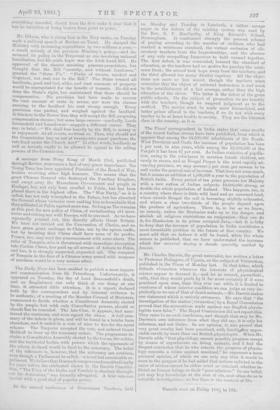Mr. Charles Darwin, the great naturalist, has written a letter
to Professor Holmgreu, of Upsala, on the subject of Vivisection, published in the Times of Monday last. In that letter, which defends vivisection wherever the interests of physiological science appear to demand it,—and, let us remark, parentheti-, cally, that they would profit by it far more certainly if it were practised upon man, than they ever can while it is limited to creatures of whose interior condition we can judge so very im- perfectly as we can of that of dumb animals,—Mr. Darwin makes one statement which is entirely erroneous. He says that "the investigation of the matter [vivisection] by a Royal Commission proved that the accusations made against our English physio- logists were false." The Royal Commission did not report this. They came to no such conclusion, and though that may be Mr. Darwin's own inference from what they did say, it is only his inference, and not theirs. In our opinion, it was proved that very great cruelty had been practised, with bardlyAny appre- ciable result, by more than one British physiologist. When Mr. Darwin adds "that physiology cannot possibly progress except by means of experiments on living animals, and I feel the deepest conviction that be who retards the progress of physio- logy commits a crime against mankind," he expresses a mere personal opinion, of which we can only say that it would be more to the purpose if be had added that torture inflicted in the cause of science cannot be either cruel or criminal, whether in- flicted on human beings or their " poor relations." In our belief, you may buy lcnowledge at the cost of sin, and often do so in scientific investigatious, no less than in the conduct of life.


































 Previous page
Previous page